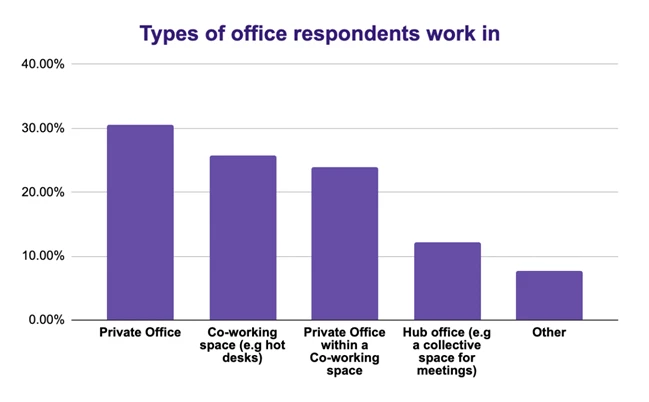- 2 Minute Read
- 20th September 2024
Why Do Private Offices Still Hold Value in a Co-Working World
As the workplace landscape has shifted dramatically over the last few years, driven in large part by the Covid-19 pandemic, flexible working and hybrid models have gained significant traction. Co-working spaces have surged in popularity as they offer businesses flexibility, cost-efficiency, and networking opportunities. Yet, despite this boom in shared work environments, private offices still hold considerable value for many professionals and businesses.
According to recent research, 30.6% of UK workers still prefer a private office as their primary workspace. This number surpasses the 25.7% of workers who favour co-working spaces, showing that even in an era of increasing flexibility, private offices remain a top choice for many.

Our research on the office worker’s preference and attitudes towards work environment in the UK also suggests that 34% prefer in-person contact with team members which is a strong reason for working from a private office. Working around your team in an office space dedicated to your brainstorming sessions has a higher likelihood of yielding a productive output as opposed to working individually in a coworking environment. Moreover, 30.42% also believe that it increases creativity being in a team environment which is seen highest in the IT & Telecom industry.
While the most important factor for those choosing to work from a coworking space is having a sense of community, it is largely restricted to those who work solo. For teams, the sense of community found in coworking spaces might be less impactful compared to the structured and focused environment of a private office. In essence, coworking spaces excel in fostering a communal atmosphere for individual professionals while private offices remain essential for teams requiring dedicated spaces to optimize their collaborative efforts.

Co-working Vs Private Offices
1. Privacy and Confidentiality
Unlike co-working spaces, where privacy can be limited, private offices provide secure environments for handling sensitive information. Legal firms, financial institutions, and other businesses that deal with confidential data benefit from the added security and discretion offered by private offices, which co-working spaces may not guarantee.
2. Control Over Work Environment
In co-working spaces, noise levels, temperature, and layout are often out of your control. Private offices, on the other hand, allow businesses to customize their environment, ensuring a focused, distraction-free workspace that is tailored to their needs.
3. Professional Image and Branding
Co-working spaces typically offer limited options for personal branding. Private offices, however, allow businesses to fully customize their space with logos, decor, and design elements, presenting a professional and cohesive image to clients and stakeholders.
4. Team Collaboration and Productivity
While co-working spaces encourage networking, private offices offer a focused setting for team collaboration. Private offices allow teams to brainstorm, hold meetings, and have discussions without interruptions, which is harder to achieve in shared spaces.
5. Long-Term Commitment and Stability
Co-working spaces often provide flexible, short-term memberships, which may not be ideal for businesses looking for long-term stability. Private offices, with dedicated leases, offer a permanent base of operations for companies needing consistency.
6. Space for Sensitive Equipment and Materials
Private offices are better suited for businesses requiring secure storage or specialized equipment than co-working spaces. Co-working environments often need more security and infrastructure to accommodate these needs.
7. Work-Life Balance for Entrepreneurs
The flexible and shared nature of co-working spaces can blur the line between work and personal life. Private offices provide a dedicated workspace that helps entrepreneurs maintain a clearer separation, fostering better work-life balance.
Conclusion
While co-working spaces offer flexibility, networking, and a sense of community, private offices continue to hold significant value for businesses and professionals who prioritize privacy, control, and team collaboration. The structured environment, customization options, and long-term stability of private offices cater to the needs of teams and businesses handling sensitive information, specialized equipment, or seeking a dedicated space to boost productivity. As the demand for hybrid work continues to grow, real estate brokers must balance the benefits of co-working spaces with the enduring appeal of private offices to meet the diverse needs of today's workforce.
